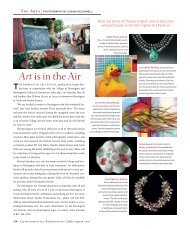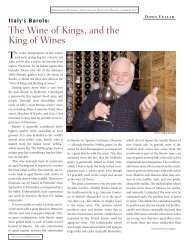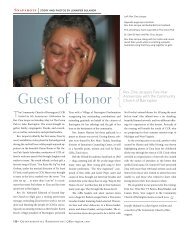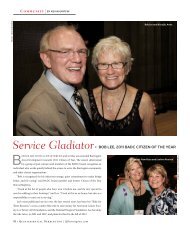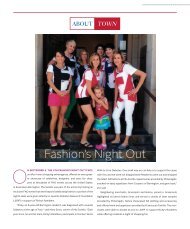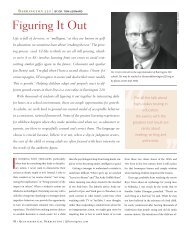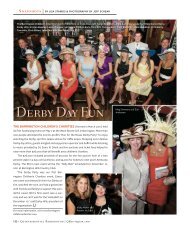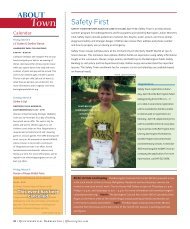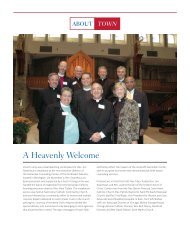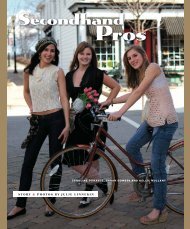Field of Vision - Quintessential Barrington Magazine
Field of Vision - Quintessential Barrington Magazine
Field of Vision - Quintessential Barrington Magazine
Create successful ePaper yourself
Turn your PDF publications into a flip-book with our unique Google optimized e-Paper software.
The Arts<br />
by Jeffrey Westh<strong>of</strong>f | Photos Courtesy <strong>of</strong> Robert McGinley<br />
Looking west over Horizon Farms<br />
<strong>Field</strong> <strong>of</strong> <strong>Vision</strong><br />
hotographic artist Robert McGinley’s favorite subject is<br />
the horizon. “When you are shooting a horizon, you have this experience<br />
<strong>of</strong> continual travel, <strong>of</strong> continual momentum into deep space,”<br />
says the <strong>Barrington</strong> Hills native. “The horizon represents a place <strong>of</strong> rest and<br />
the beginning <strong>of</strong> infinity.”<br />
The horizon is an intersection <strong>of</strong> many things, <strong>of</strong> the land and the sky, <strong>of</strong><br />
today and tomorrow, <strong>of</strong> the world and its potential. A decade ago, McGinley’s<br />
life and art intersected at Horizon Farms, the 421-acre equestrian property<br />
that his parents, Jane and William McGinley, established nearly 30 years ago.<br />
For a time, it was one <strong>of</strong> the biggest thoroughbred breeding farms in Illinois,<br />
boarding up to 150 horses. Thirty miles <strong>of</strong> fence lined the property. “It was a<br />
very large operation,” McGinley says.<br />
Robert McGinley, who was 30 when his parents bought the farm on Algonquin<br />
Road west <strong>of</strong> Route 59, stood on the property with his father shortly<br />
after the purchase in 1983 and admired the view. “The horizon goes on forever,”<br />
McGinley said. “Horizon,” his father replied, “Horizons Farms.” The<br />
name stuck.<br />
McGinley became interested in photography while a student at <strong>Barrington</strong><br />
High School. He attended the famed California Institute <strong>of</strong> the Arts<br />
to develop his interest in photography, as well as writing and sculpture. After<br />
one <strong>of</strong> the barns at Horizon Farms<br />
graduation, he remained on the West Coast to pursue a career in the arts. He<br />
wrote and directed “Jimmy Zip”, a film that won the best dramatic feature<br />
award in 1999 at the Hollywood Film Festival. But in December 2000, Mc-<br />
Ginley received a phone call that led him to redirect his passion and pursue<br />
landscape photography to promote land preservation and conservation.<br />
142 • <strong>Quintessential</strong> <strong>Barrington</strong> | Q<strong>Barrington</strong>.com
The call was from his father, who was ill and<br />
asked him to come home to help with the farm.<br />
William McGinley died the following month.<br />
As McGinley assumed management duties, he<br />
and his two siblings began to realize they would<br />
not be able to operate the massive farm as their<br />
parents had. They worried that if they sold the<br />
farm, developers would carve it up into 5-acre<br />
parcels and build as many as 80 homes. “When<br />
Dad passed away, there were a lot <strong>of</strong> calls from<br />
developers,” McGinley says, adding that those<br />
calls upset his mother.<br />
The family looked into strategies that would<br />
guarantee Horizon Farms would remain open<br />
land and that its wildlife and wetlands would be<br />
protected. While doing this research, McGinley<br />
learned <strong>of</strong> conservation easements. A conservation<br />
easement allows a landowner to designate<br />
how the property will be used no matter who<br />
holds the deed in the future. Once the conservation<br />
easement is drawn up, the landowner enters<br />
into a legal agreement with a qualified, nonpr<strong>of</strong>it<br />
conservation organization, usually a land trust, or<br />
a public agency that will monitor the land and enforce<br />
the guidelines.<br />
McGinley stresses that the landowner decides<br />
the rules <strong>of</strong> a conservation easement, not the trust<br />
that will administer those rules. “You are designing<br />
the future for your heirs, the people coming<br />
behind you,” he says. “You’re committing yourself<br />
to land preservation in perpetuity.”<br />
When Jane McGinley died in February 2003,<br />
her children stepped up their efforts to create a<br />
conservation easement that would maintain Horizon<br />
Farms as an open space. The agreement was<br />
completed in the fall <strong>of</strong> that year, with the easement<br />
jointly controlled by the Naperville-based Conservation<br />
Foundation and the <strong>Barrington</strong> Area Conservation<br />
Trust, which was founded in 2001.<br />
Karen Yancey, executive director <strong>of</strong> the <strong>Barrington</strong><br />
Area Conservation Trust, says McGinley’s<br />
faith in the fledgling organization helped it<br />
to grow. “Robert is one <strong>of</strong> our favorite people,” she<br />
says, “because he had the courage and tenacity to<br />
see through the creation <strong>of</strong> an easement <strong>of</strong> that<br />
size.” At more than 400 acres, the Horizon Farms<br />
property is one <strong>of</strong> the largest, possibly the largest,<br />
conservation easements in the state.<br />
The McGinley family sold Horizon Farms at<br />
auction in October 2006. The current owners have<br />
maintained the property as a horse farm, which<br />
was McGinley’s hope. He bought a 14-acre slice<br />
<strong>of</strong> the farm, also part <strong>of</strong> the easement, to maintain<br />
his family’s tie to the land.<br />
McGinley now divides his time between <strong>Barrington</strong><br />
Hills and his home in Santa Monica,<br />
where he is active in efforts to preserve the local<br />
coastline. Although he says he has been shooting<br />
landscapes “all my life,” he did not begin to photograph<br />
Horizon Farms until he returned home<br />
in 2001.<br />
“It soon became an obsession,” he says. “It appealed<br />
to my sense <strong>of</strong> connection to the land, to<br />
nature.” Because McGinley returns to the <strong>Barrington</strong><br />
area once a month, he sees a new perspective<br />
<strong>of</strong> the farm with every visit. “I was always<br />
getting a fresh look at different weather and light<br />
patterns,” he says. “I was fascinated by the way the<br />
same location would change.”<br />
One morning this summer,<br />
photographers everywhere<br />
grabbed their cameras<br />
when these unusual cloud<br />
formations arrived.<br />
Robert McGinley noticed similar<br />
images to his, found online<br />
later that day from other parts<br />
<strong>of</strong> the country.<br />
As he continued to photograph the farm, his<br />
connection to it deepened. He saw the landscape as<br />
a natural work <strong>of</strong> art. “I found the experience <strong>of</strong> being<br />
able to witness and photograph the farm a very<br />
peaceful experience, and some ways spiritual, too.”<br />
McGinley used his photography to build the<br />
case for the conservation easement. “The first<br />
step was being able to show trustees and attorneys<br />
the importance <strong>of</strong> the land,” he says, “that<br />
the land has aesthetic value that goes beyond just<br />
development value.”<br />
“Documentary-style” photographs helped to<br />
prove that the property could support and preserve<br />
wildlife and that it contained “view corridors”<br />
that the public could see from the road<br />
– two criteria needed for the IRS to approve the<br />
easement. McGinley also included artistic photos<br />
in the IRS submission. “It was hopefully able to<br />
show the inspiration I get from the experience <strong>of</strong><br />
being on the farm.”<br />
McGinley hopes that all viewers, not just IRS<br />
agents, get a sense <strong>of</strong> that inspiration from his<br />
art. “Being able to have a moment <strong>of</strong> tranquility<br />
is something I hope the photographs can convey,”<br />
Q<strong>Barrington</strong>.com | <strong>Quintessential</strong> <strong>Barrington</strong> • 143
Left: Robert McGinley<br />
he says. Many <strong>of</strong> his photographs will be<br />
exhibited at La Citadelle Art Gallery at The<br />
Arboretum <strong>of</strong> South <strong>Barrington</strong>, from Oct.<br />
6 through Jan. 6, 2013 (see sidebar).<br />
Yancey believes that McGinley’s love <strong>of</strong><br />
the land and his “conservation ethic” is visible<br />
in his photography. “He’s been able to<br />
translate that into his photography and his<br />
art and, really, all aspects <strong>of</strong> his life.”<br />
Yancey has also seen this in a photograph<br />
that she once took on Horizon<br />
Farms. During an annual visit to monitor<br />
the land for the <strong>Barrington</strong> Area Conservation<br />
Trust, Yancey saw a man on horseback<br />
approaching from the distance. She raised<br />
her camera to shoot the rider, realizing just<br />
as she snapped the picture that it was Mc-<br />
Ginley. It became her favorite image <strong>of</strong> the<br />
man. “He looked so at peace with the land<br />
around him, and all that he has done to preserve<br />
it,” she says.<br />
Robert McGinley<br />
La Citadelle exhibit<br />
hotographs by <strong>Barrington</strong> Hills native Robert McGinley will be<br />
exhibited from Oct. 6 through Jan. 6, 2013, at La Citadelle Art Gallery.<br />
McGinley will appear at an artist reception to mark the exhibition’s<br />
opening and he will return to present an artist’s talk to discuss his approach<br />
to landscape photography and how it can be used as a conservation<br />
land tool (event details below).<br />
The exhibition will feature photographs taken at Horizon Farms,<br />
the <strong>Barrington</strong> Hills property McGinley’s family owned from 1983 until<br />
2006. Other images were taken in the mountains <strong>of</strong> Utah, the great<br />
plains <strong>of</strong> Georgia, and waterfronts in Ireland and Southern California.<br />
“Robert’s photographs have a kind <strong>of</strong> serenity,” says Vesna Boscovic,<br />
president <strong>of</strong> La Citadelle Art Gallery. “You can’t walk by Robert’s photography.<br />
You have to stop and look.”<br />
La Citadelle Art Gallery opened in early January with an aim to<br />
promote the exchange <strong>of</strong> art and culture between North America and<br />
Europe. Boscovic once operated a gallery with the same philosophy<br />
in the Paris suburb, St. Germain. La Citadelle Art Gallery is a nonpr<strong>of</strong>it<br />
corporation that uses its proceeds to benefit artists on both continents.<br />
For more information or to contact Robert McGinley, visit<br />
www.robertmcginleyphotography.com or call 310-399-1768.<br />
Event details:<br />
“From DAWN ’til DUSK: Air, Water and Landscape Photography”<br />
by Robert McGinley will be held at La Citadelle Art Gallery, located in Unit H-45<br />
at The Arboretum <strong>of</strong> South <strong>Barrington</strong>. It runs from Oct. 6, 2012 to Jan. 6, 2013.<br />
There is an opening reception with the artist on Sat., Oct. 6, at 7 p.m.<br />
An artist’s talk by McGinley will be held at 7:30 p.m. on Oct. 8.<br />
If a member <strong>of</strong> the <strong>Barrington</strong> Area Conservation Trust purchases<br />
one <strong>of</strong> Robert McGinley’s pieces, proceeds (minus printing and framing costs)<br />
can be designated to benefit the trust.<br />
For more information on the event, contact Vesna Boscovic at<br />
La Citadelle Art Gallery at 224-622-9578, email vesna.boscovic@gmail.com,<br />
or visit www.lacitadelle.net.<br />
144 • <strong>Quintessential</strong> <strong>Barrington</strong> | Q<strong>Barrington</strong>.com



